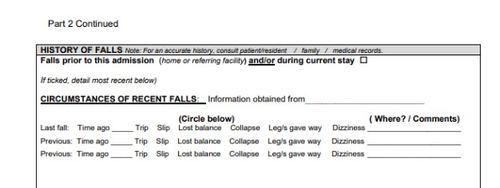The Basic Principles Of Dementia Fall Risk
The Basic Principles Of Dementia Fall Risk
Blog Article
Dementia Fall Risk for Beginners
Table of ContentsDementia Fall Risk for BeginnersGet This Report on Dementia Fall Risk8 Easy Facts About Dementia Fall Risk ExplainedDementia Fall Risk Can Be Fun For AnyoneGetting My Dementia Fall Risk To Work
The FRAT has three sections: fall risk status, risk aspect list, and activity plan. An Autumn Threat Standing includes data concerning background of current falls, medications, mental and cognitive status of the client - Dementia Fall Risk.If the person ratings on a threat variable, the equivalent number of factors are counted to the person's fall risk score in the box to the far. If a patient's fall risk score amounts to 5 or higher, the person goes to high risk for falls. If the person ratings just 4 factors or lower, they are still at some danger of falling, and the nurse ought to use their finest medical evaluation to take care of all fall risk factors as component of an all natural treatment plan.
These common techniques, in basic, help establish a safe atmosphere that lowers unexpected drops and delineates core precautionary actions for all clients. Indications are vital for individuals at risk for falls.
The Definitive Guide to Dementia Fall Risk
As an example, wristbands must consist of the client's last and first name, date of birth, and NHS number in the UK. Information need to be printed/written in black versus a white history. Just red shade should be used to signal unique client status. These suggestions follow present growths in patient identification (Sevdalis et al., 2009).
Products that are too far may require the client to connect or ambulate needlessly and can potentially be a hazard or add to drops. Assists prevent the individual from heading out of bed with no aid. Registered nurses reply to fallers' call lights faster than they do to lights launched by non-fallers.
Visual impairment can considerably trigger drops. Hip pads, when used properly, may lower a hip crack when loss occurs. Maintaining the beds closer to the floor reduces the threat of falls and severe injury. Positioning the mattress on the flooring significantly decreases loss risk in some medical care setups. Low beds are designed to decrease the range a person falls after relocating out of bed.
Not known Details About Dementia Fall Risk
Clients who are tall and with weak leg muscle mass that try to remain on the bed from a standing setting are likely to drop onto the bed because it's also low for them to lower themselves safely. If a high patient attempts to get up from a reduced bed without help, the person is most likely to drop back down onto the bed or miss out on the bed and fall onto the floor.
They're created to advertise timely rescue, not to stop falls from bed. Audible alarm systems can additionally advise the person not to rise alone. Making use of alarm systems can additionally be an alternative to physical restraints. In addition to bed alarm systems, increased guidance for risky people additionally might aid protect against drops.

People with an evasion stride increase fall he has a good point chances considerably. To minimize autumn risk, shoes need to be with a little to no heel, slim soles with slip-resistant walk, and support the ankle joints.
The Dementia Fall Risk Diaries
Individuals, specifically older adults, have actually reduced aesthetic capability. Lights an unknown setting helps boost exposure if the person need to obtain up in the evening. In a research study, homes with ample illumination record less falls (Ramulu et al., 2021). Enhancement in illumination at home might lower fall prices in older grownups (Dementia Fall Risk). Making use of stride belts by all visit this site right here health and wellness treatment providers can promote security when helping clients with transfers from bed to chair.

Sitters work for assuring a secure, safeguarded, and secure environment. However, studies demonstrated extremely low-certainty evidence that sitters lower fall risk in acute treatment health centers and just moderate-certainty that alternatives like video clip surveillance can minimize caretaker usage without boosting autumn danger, recommending that sitters are not as beneficial as at first believed (Greely et al., 2020).
Dementia Fall Risk Fundamentals Explained

Enhanced physical fitness decreases the risk for drops and limits injury that is suffered when loss takes place. Land and water-based workout programs may be in a similar way advantageous on balance and stride and thereby decrease the danger for drops. Water exercise may add a positive advantage on balance and stride for females 65 years and older.
Chair Surge Workout is an easy sit-to-stand workout that helps enhance the muscles in the web upper legs and buttocks and enhances mobility and self-reliance. The objective is to do Chair Surge workouts without making use of hands as the client comes to be stronger. See resources section for a comprehensive guideline on how to do Chair Increase workout.
Report this page